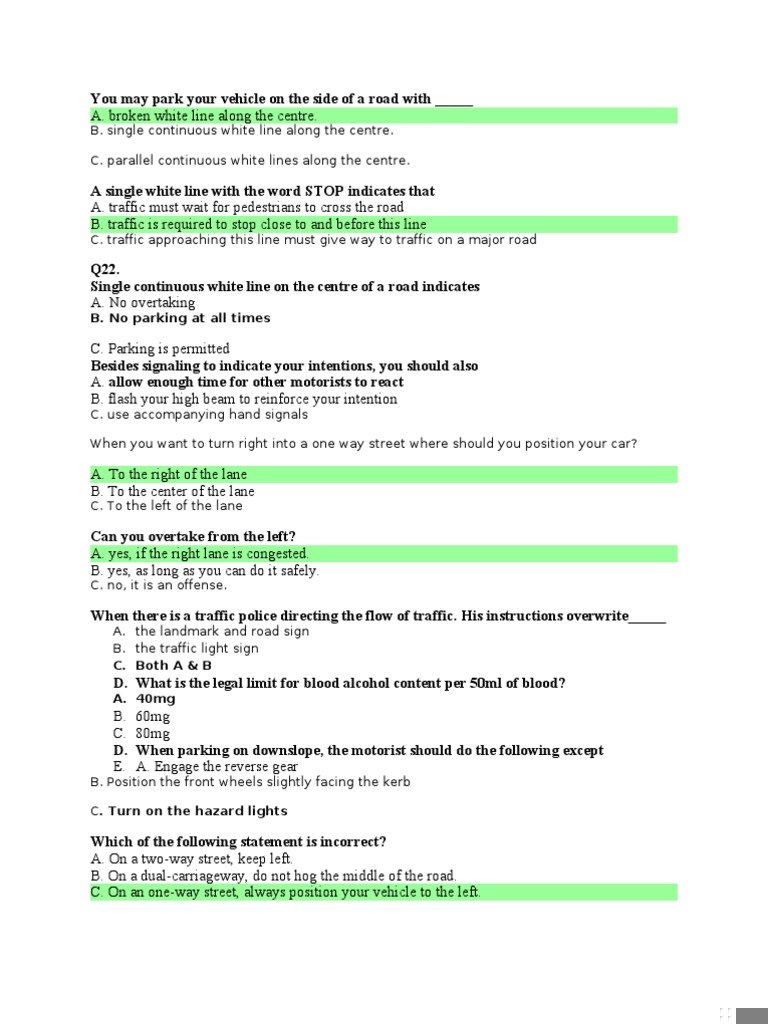Parking is allowed if the vehicle is properly positioned and adheres to local regulations. Many drivers often find themselves uncertain about where they can park without risking a ticket. Understanding parking rules is crucial to avoid fines and keep the flow of traffic smooth.
Local signs and regulations guide us on safe parking practices, so it’s important to pay attention to what they say. Whether you’re downtown or in a residential area, being informed can save you time and hassle. Embracing these guidelines will make your parking experience stress-free and straightforward.
Parking is Allowed if the Vehicle is Properly Positioned
When it comes to parking, understanding the rules can help you avoid tickets and other hassles. The phrase “Parking is allowed if the vehicle is” opens the door to a range of conditions that determine whether your car can legally occupy a space. Let’s explore the key factors that influence proper parking, understand the signs, and navigate common scenarios that define where you can park your vehicle without facing penalties.
The Importance of Parking Regulations
Parking regulations exist for several reasons:
- Safety: Proper parking minimizes the risk of accidents. Vehicles parked correctly are less likely to obstruct traffic flow or endanger pedestrians.
- Access: Regulations ensure that emergency vehicles can access streets and buildings quickly, especially in emergencies.
- Fairness: Rules help create a fair system where everyone has an equal chance of finding a parking space.
When parking your vehicle, it’s crucial to pay attention to both posted signs and the surrounding environment.
Understanding Different Parking Signs
Parking signs can be confusing, but knowing what each sign means can save you time and money. Here’s a look at some common signs and what they indicate:
No Parking Signs
These signs indicate areas where parking is not allowed at any time. Common situations include:
- Near fire hydrants
- In front of driveways
- In bus lanes
If you park in these areas, you risk getting a ticket or having your vehicle towed.
Time-Limited Parking
Some areas allow parking only for a limited time. Signs usually specify the hours or duration allowed, such as:
- 1-hour parking from 8 AM to 6 PM
- 2-hour parking on weekends
Make sure to adhere to these time limits to avoid fines.
Permit Parking Only
Certain areas require a parking permit for residents or authorized vehicles. If you don’t have a permit, you cannot park there. Always check if a permit is necessary before leaving your car.
Special Considerations for Parking
There are specific considerations you need to keep in mind to ensure that parking is allowed if your vehicle is properly positioned:
Parking on Streets vs. Off-Street Parking
Street parking presents its own unique set of challenges. It is essential to check for signs indicating whether parking is allowed and for how long. Here’s a quick comparison:
| Factor | Street Parking | Off-Street Parking |
|---|---|---|
| Accessibility | Subject to city regulations | Often more space |
| Safety | Higher risk of accidents | Generally safer |
| Fees | May require payment | Can be free or have a flat fee |
When deciding where to park, consider the pros and cons of each option.
Parking Near Schools and Playgrounds
Parking near schools and playgrounds can be tricky. Generally, there are strict regulations around these areas to ensure the safety of children. Always look for specific signage that indicates:
- No parking during school hours
- Drop-off zones
- Bus stops
Parking in such areas without following the rules can lead to hefty fines.
Handicap Parking
Handicap parking spots are reserved for individuals with disabilities. If you have a handicap sticker or license plate, you can park in these designated areas. Here are the things you should remember:
- Always display your handicap permit clearly on your vehicle.
- Do not park in these spaces without the proper permit, as it can result in a fine.
- These spots are typically closer to buildings, making them essential for those with mobility challenges.
Respecting these parking rules is essential for the convenience and safety of all drivers.
Parking Etiquette: Common Courtesy in Parking Areas
Good parking etiquette is about respecting others and being a considerate driver. Here are some best practices:
- Park within lines: Always park your vehicle neatly within the designated lines to avoid taking up extra space.
- Leave enough space: If you’re parking next to another vehicle, leave enough room for others to get in and out comfortably.
- Be mindful of pedestrians: Always yield to pedestrians when entering and exiting parking spaces.
Following these simple courtesies can make parking a more pleasant experience for everyone.
Creative Parking Solutions
As cities grow and space becomes limited, innovative parking solutions are emerging. Here are some trends worth noting:
Smart Parking Apps
Many cities have embraced technology to help drivers find parking more easily. Smart parking apps allow you to:
- Locate available parking spots in real-time.
- Pay for parking through your smartphone.
- Reserve spaces ahead of time.
These apps can save you time and reduce frustration when looking for a place to park.
Shared Parking Spaces
Some businesses offer shared parking spaces during non-business hours. For example, a shopping center might allow nearby residents to park there overnight. This creative solution can help alleviate parking shortages in busy areas.
Understanding Parking Fines and What to Do If You Get One
Despite your best efforts, you may still receive a parking fine. Here’s a guide on what to do if you find yourself in this situation:
How to Appeal a Parking Ticket
If you believe you received a ticket unfairly, you can usually appeal it. Here’s a step-by-step guide:
- Review the ticket: Ensure all information is accurate, including the date, time, and location.
- Gather evidence: Take photographs of the area, parking signs, and your vehicle’s position.
- File an appeal: Follow the instructions on the ticket for submitting an appeal.
Remember to act quickly, as many jurisdictions have strict deadlines for appeals.
Paying Your Fine
If you decide not to contest the ticket, be sure to pay it promptly. Most jurisdictions offer several ways to pay your fine, such as online, via mail, or in person. Be aware of deadlines to avoid additional penalties.
Understanding where parking is allowed, based on the position of your vehicle, plays a significant role in avoiding fines and ensuring safety on the roads. By paying attention to signs, respecting designated areas, and following common parking etiquette, you contribute to a more organized and efficient parking system. The next time you park, take a moment to check that you comply with all local regulations, ensuring that your vehicle is in a lawful and considerate position.
Ask 2: Is parking in front of others' houses legal?
Frequently Asked Questions
“`html
What are the criteria for legally parking a vehicle in a residential area?
To park legally in a residential area, a vehicle must be parked within the marked lines of a designated parking space, not block driveways or fire hydrants, and comply with any posted signs regarding parking restrictions. Additionally, the vehicle should not be parked on sidewalks or in front of mailboxes.
Can I park in a commercial zone after hours?
Yes, you can generally park in a commercial zone after hours if there are no specific restrictions posted on signage. Always check for any signs that indicate time limits or reserved parking spaces that may apply outside of regular business hours.
Are there specific vehicle types that have parking restrictions?
Certain vehicle types, such as oversized trucks, trailers, or RVs, often face parking restrictions in both residential and commercial areas. These vehicles may be prohibited from parking in standard spaces due to their size. Always consult local regulations for specific rules regarding different vehicle types.
Is it allowed to park on the street during snow emergencies?
Parks may become restricted during snow emergencies to facilitate snow removal. Many municipalities enforce temporary no-parking mandates on designated streets during such events. Always check local alerts or signs to avoid fines or towing during snow emergencies.
Do I need a permit to park in certain neighborhoods?
Some neighborhoods require residents or visitors to display a parking permit to park on the street. These permits help manage parking availability and may be enforced during specific hours. Check with your local municipality or neighborhood association for permit requirements and application processes.
“`
Final Thoughts
Parking is allowed if the vehicle is parked in designated spaces, adheres to local regulations, and does not obstruct traffic. Always check for signage that indicates parking rules specific to the area. Additionally, ensure that your vehicle does not exceed the allowable time limits or dimensions. Understanding these guidelines helps maintain order and ensures everyone can find parking easily.
















